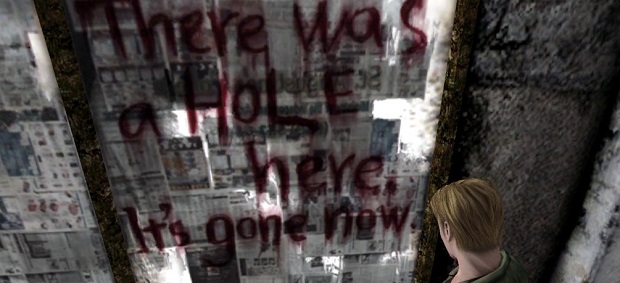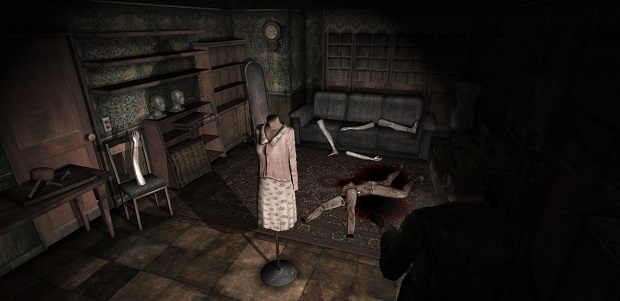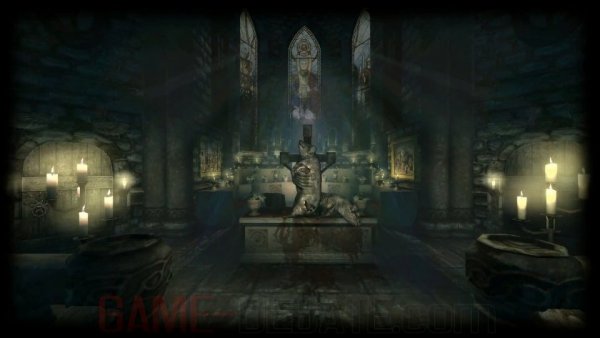Horror: The Games I Can't Play
[Dealing with] the horror, the horror!
Something I can't do – have never been able to do – in terms of what I do for a living is enjoy horror games.
That's why I've decided to talk the matter over with Adam, one of the RPS resident horror fans and the chap whose own most recent supporter post dealt with Five Nights At Freddy's; a nasty, brutish horror game but one not without merit or skill.
I should clarify that when I say I can't play horror I'm talking about horror games like the Silent Hill series or things like Slender: The Eight Pages. I should clarify further that I *think* I'm talking about those kinds of games but often there's no way to be sure without getting further into them than I'm currently able to do without ruining any remaining ability to sleep.
I mean, let's talk PT. I appreciate it's not a PC title but the Silent Hills teaser demo thingy illustrates the point I'm making in terms of basic inability to horror game. I played PT in broad daylight with two friends. No, that's not entirely true. I wasn't even playing. I was sitting next to one of my friends – the player – on the sofa and offering advice. That was about as close to the game as I could get.
Both friends had done that thing of assuming "I'm really not great with horror" just meant "We can have a good giggle at Pip during jump scares". What it actually meant was "Pip will get paler and more rigid and eventually will be on the verge of tears and it will feel horribly cruel and then Pip will spend the next week or two terrified of going to the bathroom in the night." We switched off the console about halfway through the experience and I had a medicinal Dip Dab.
Adam did not have this response. He liked PT (or rather he has liked the videos he's seen of it being played because he's not cheating on his PC with a console like I am). There are two main reasons for this. The first is that you can go back and analyse the imagery and ideas after the fact. The second is that Adam has enough trust in the creators because of the previous Silent Hill games that he's willing to believe there's more to PT than just being an exercise in grim discomfort.
[Fun fact: I don't know for sure this is the PT video it claims to be as I cannot bring myself to watch it]
"I think for something like that to work, it's the process of deciphering after the fact that makes it anything more than a cheap thrill," is what he types at me over IM. "And that word, 'thrill', is probably far more important than I realised when I typed it. The distinction between being thrilled and being stressed out. I find that once I tip over into a sense of stress, I'm not happy, I feel punished and I want to stop."
My sense of stress kicks in far earlier than Adam's, sometimes never even allowing for the thrill. I get that there's a lot of work and artistry which can go into making a scenario or character truly creepy – knowing how to score those moments, understanding which physical distortions players react to most strongly, not showing too much of a monster, not repeating old tricks too many times – I just get no pleasure from going into or revisiting those experiences.
I'm trying to understand what it is that makes other people able to process those games better than I can. "I'm guessing it's often predicated on being able to deal with the experience in a different way?" I ask Adam. "I can't handle the initial experience at all so there's no pleasure in returning to pick it apart."
Adam replies, "My feeling is that if there's no puzzle to piece together at the end of the experience - and the puzzle can be purely an attempt to reconstruct a narrative or psychological nudge - then it's just light and shadow artfully arranged which I don't object to but personally, I want the aftermath to matter. I want to be able to go back and understand. I think the best horror often loses some of its power to terrify once it has been experienced and analysed. The terror should translate into something else, rather than leaving an empty shell.
"I think the best horror often has a sense of catharsis. And with Silent Hill as a series, that's perhaps why the actual narrative leans heavily on tragedy. It's more than just the sense of being confronted with horror and knowing that you're actually safe - although that's important too."
He cites the movie A Tale Of Two Sisters. "There are scenes that are so claustrophobic and unpleasant - just a horrible combination of sound and image - that I struggled to stick with it the first time I watched. No gore or particularly hideous imagery - just a sense of something absolutely terrible happening. A haunting of the mind. But I can watch it now and feel this deep sadness. It's a tragic film that happens to be horrifying. I think Silent Hill is often the same."
Going back to the point about what lies beyond the initial fear response, Adam adds, "Pushing through that [terror] can lead to something valid, but it takes a lot of faith in the creator."
"Would you say the onus is on the viewer to push past the horror rather than being on the creator to make it accessible?" I ask.
"I think there's always give and take. Whenever I go into an experience, it's like I'm choosing to buy a ticket. Depending who created the ride, I'm more or less likely to buy in. And that goes for melodrama as much as horror. If I think the experience isn't going to pay off and the price keeps getting higher, I'll bow out."
Silent Hill 2 is a game which was recommended to me a lot when I tweeted asking for 'starter' horror games. It's also a bit of an awkward one as it's not legally available via digital means. One must hunt down a relatively pricy physical copy on eBay or the Amazon marketplace (or get Adam to bring it over next time he's in town). It sounds tempting as he describes it, although I'm really not sure he and I will have the same experience.
"Like a broken record, I'll always go back to Silent Hill 2 because I think it has an emotional resonance beyond fear from the very beginning. It's a love story with elements of a haunting that goes deeper and deeper into uncomfortable territory - in a purely sensory way as well as through its narrative - but never ceases to pull at other strings. I think Amnesia: A Machine For Pigs does something similar but I'm an outlier there. A lot of people really really don't like it, which is fine."
Oh! A game I have actually played! In fact I have also played Amnesia: The Dark Descent. I regret streaming parts of that playthrough because Brendan Caldwell started texting me to try and freak me out.
I liked A Machine For Pigs in a lot of ways and it tries to do interesting things with the types of horror it offers up. It's an atmospheric game which [POTENTIAL SPOILERS] starts off dealing in psychological horror, then goes into a more physical avoid-the-monster mode and finishes up in a grandiose horror at the nature of humanity. It misses a fair few beats, particularly in the middle section where sometimes I'd let myself get caught by something monstrous because the respawn point was in a useful location.
"I think you've touched on something there," says Adam. "It moves through three flavours - and that helps. It's not the same drum banging away for a few hours. That's draining, no matter how talented the drummer is. And A Machine For Pigs shows a clear understanding of variations on its theme, which I think is also necessary."
"Take PT - what is it about? A murdered family. A place that's haunted. Is it about piecing together clues and trying to understand the event? Or is it about the inability to escape tragedy - I don't know. I think there has to be an effort to communicate something other than 'lawks, isn't this grim?'"
The sadness and the tragedy of horror is something I recognise far more easily in art. Adam brings up a Caravaggio painting where David is clutching the head of Goliath by its hair and I send over a few depictions of Judith beheading Holofernes (a story from the apocrypha or deuterocanon depending on whether taking a Protestant or Catholic point of view).
In these moments there's a strong horror element. It's particularly pronounced in Artemisia Gentileschi's Judith Slaying Holofernes. Holofernes' hand is clutching at Judith's maid's top in desperation as Judith saws away at his neck, brow furrowed in concentration, arms tense with the effort of actually cutting through the man's neck. It's a horrible image and one which contains within it panic, fragility, disempowerment, sadness – many of the things Adam is telling me he finds in the best horror games and movies. This isn't Slender Man-type jump scares, but something deeper.
"I don't think I've ever gotten that experience from horror movies or games though," I say. "Perhaps it's because they're hundreds of images all at once so there's no chance to consider or de-panic?"
"Yeah. A horror game shouldn't be trying to do the same thing but they can instruct one another. There's some good work done with tableaux in the earlier Silent Hill games - which are these oddly tranquil moments. But I think games - in general and particularly in horror - are much better at places than people. Which makes the Silent Hill series being named after a place very appropriate. There's a lot of clever use of space - uncanny environments. That can do wonders with a sort of domestic horror - because home is the place we should be most familiar with. Turn a shadow sideways and it becomes alien."
I'm not ultimately convinced I will be able to share this experience. I'm worried that PT will happen again – that the experience of playing will ultimately prove too overwhelming to allow space for the more subtle and moving notes to rise up. But I have agreed to play a handful of horror games – Silent Hill 2, Knock-Knock and possibly 5 Days A Stranger.
Let's see if I can find a way into this genre.
This article was funded by the RPS Supporter program.




